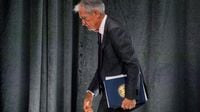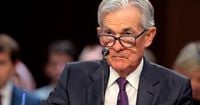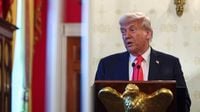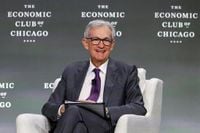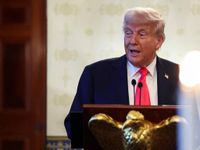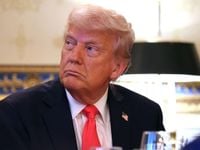On April 17, 2025, President Donald Trump launched a blistering attack on Federal Reserve Chair Jerome Powell, declaring that Powell's "termination cannot come fast enough!" This statement reflects Trump's ongoing frustration with the Fed's monetary policy, particularly its reluctance to lower interest rates in the face of economic challenges exacerbated by his administration's tariff policies.
The president's comments came just a day after Powell expressed concerns about the impact of Trump's tariffs on inflation and economic growth. During a speech at the Economic Club of Chicago, Powell warned that the tariffs could lead to a rise in inflation and slow down economic growth, stating, "Our obligation is to keep longer-term inflation expectations well anchored and to make certain that a one-time increase in the price level does not become an ongoing inflation problem." This cautious approach has put the Fed in a difficult position, as it must balance the risks of inflation with the need to support economic growth.
In his Truth Social post, Trump criticized Powell, whom he mockingly referred to as "Too Late," for not acting swiftly enough to lower interest rates. Trump has been vocal about his belief that the Fed should have already cut rates this year, arguing that doing so would stimulate economic activity. He wrote, "Powell should certainly lower interest rates, like the ECB, long ago, but he should certainly lower them now." The European Central Bank has indeed been more aggressive in its rate cuts, which has added to Trump's frustration.
Since taking office, Trump has repeatedly targeted Powell, despite having nominated him to the position. The president's remarks echo his previous criticisms during his first term, which raised questions about the independence of the Federal Reserve. Traditionally, the Fed operates free from political influence, allowing it to make decisions based on economic data rather than political pressure. However, Trump's comments suggest a willingness to challenge that norm.
Powell's term as chair is set to expire in May 2026, and his position as a governor lasts until February 2028. The Fed chair has previously stated that he has no intention of resigning, responding defiantly to questions about whether he would step down if asked by Trump. In November 2020, Powell firmly stated, "No," when asked if he would resign at the president's request, adding that such a move would not be permitted under the law.
The Federal Reserve Act, established in 1913, provides the central bank with a degree of independence from the White House. While the president has the authority to remove a Fed governor "for cause," experts have noted that policy disagreements are unlikely to meet that threshold. Powell's political independence has been a recurring theme in his public statements, emphasizing that he intends to serve out his term despite the ongoing pressure from Trump.
As the economic landscape continues to shift, the Fed faces mounting challenges. Powell's warnings about potential stagflation—a scenario where inflation rises while economic growth slows—have heightened concerns among economists. If the Fed raises interest rates to combat inflation caused by tariffs, it risks stifling borrowing and further slowing economic growth. Conversely, if it lowers rates to stimulate the economy, it could exacerbate inflation.
Trump's recent remarks come at a time when U.S. consumer inflation has cooled to 2.4% as of March 2025, inching closer to the Fed's long-term target of 2%. This decline has been attributed in part to a significant drop in gasoline prices, which fell by 6.3%. However, the prices of groceries, particularly eggs, have surged nearly 6% due to ongoing supply chain issues stemming from bird flu outbreaks.
Financial markets are currently anticipating that the Fed will maintain its interest rate policy at the next meeting in May, with a two-thirds chance that rates will remain unchanged. This uncertainty reflects the broader economic climate and the Fed's cautious approach to navigating the complexities of inflation and growth.
Trump's criticisms of Powell have prompted renewed discussions about the Fed's independence and the potential implications of political interference in monetary policy. Economists and lawmakers from both parties have historically defended the Fed's ability to operate without direct political influence, recognizing the importance of maintaining a stable economic environment.
As the situation unfolds, it remains to be seen how Trump's ongoing attacks on Powell will affect the Fed's decision-making process and the broader economy. The relationship between the president and the Fed chair is emblematic of the tensions that can arise when economic policy becomes intertwined with political agendas.
In the coming weeks, as Trump continues to advocate for lower interest rates, the Fed's response will be closely monitored. The central bank's ability to navigate these pressures while maintaining its independence will be critical in shaping the future of U.S. economic policy.
